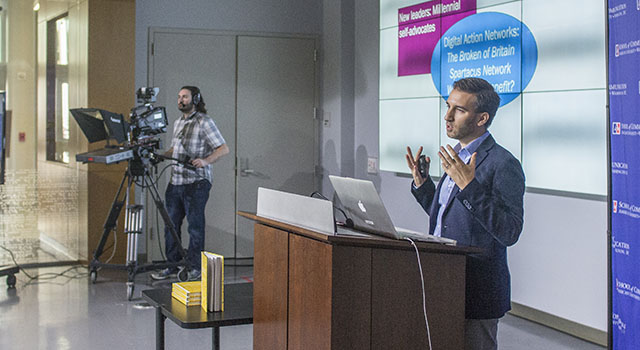
PhD in Communications
Regent University offers an online PhD in COmmunications that requires just one visit to campus. This one visit is a week-long summer residency on campus in Virginia Beach, Virginia. The entire program consists of a minimum of 56 credit hours, but some students may complete as many as 64. There are eight session start dates throughout the year, and thus, eight sessions. This helps you get done faster because there are fewer breaks.
You will take a variety of courses that will prepare you for a range of careers. You could get a higher level position in media relations, market analysis, research, or even teaching at the university level. You will be able to conduct effective research, have a deep understanding of communications theory, and have strong academic writing skills when you complete the program.
Some of the courses you’ll encounter as part of this program include Theology & Communication; Communication in a Global Environment; Academic Writing for Publication; and more. You will also virtually attend doctoral seminars, take basic research courses that are put in context for communication, and you will be required to complete a dissertation.

What is Communications?
Communications is any form of media that is used to convey one’s idea or message to another person or a group of people. People that aim to get a degree in Communications do so in order to learn how to inform and influence with the most efficacy by choosing the most appropriate delivery method of the information that needs to be provided. This could be via the web, print, audio, video, or still images, among others.
Many students that choose to pursue a degree in Communications have a passion for one or more forms of media, growing and utilizing their interpersonal skills, making professional and personal connections, and who look forward to later utilising their technical and creativity skills in order to accomplish the various tasks that they will encounter on a daily basis in their desired Communications-related career.

While studying to get a degree in the field of Communications, students will be provided with a solid foundation in the core areas of Communications on which they can choose build up towards a specialization that will enable them to focus their education path for a specific career. Students that are studying in Communications often choose to take courses in areas pertaining to Anthropology, Linguistics, Sociology, Cultural Studies or Health Care Communications, among others. These specialization courses would be taken concurrently with the core credit courses, such as Economics, Marketing, Management Theory, Media and Mixed Media Studies, Organizational Communication, and Ethics. Even if a student decides to not pursue a more focused education in the field of Communications, they will still obtain a strong understanding of the core values that many employers are looking for when they are looking for new hires to do a multitude of different professional tasks.
If you think you may have an interest in pursuing a career in Communications or any Communications-related field, we recommend you research your options when it comes to finding a school that will best suit your needs and goals. There are many great schools out there that provide many different degree options in Communications, and choosing the right school to provide you with a comprehensive and affordable education that fits into your schedule is the single most important thing that you can do to ensure your path towards a career in Communications gets off to the best possible start.
How Long Does it Take to Get a Communications Degree?

Getting a degree in Communications can take a differing amount of time, depending on a variety of factors. The main factors that will determine how long it will take to complete a degree program in the area of Communications are: whether or not you are enrolled in your school as a full-time student or as a part-time student, the degree level that you are trying to obtain (an Associate’s degree, a Bachelor’s degree, a Master’s degree or a PhD), and what specializations–if any–you are interested in focusing your degree path towards. For an Associate’s Degree in Communications–the basic degree level–it can take as little as two years to complete in most circumstances. On the other hand, to obtain a PhD in Communications, it will typically take most students an average of 8.2 years in total. The time it takes to obtain a PhD in Communications is nearly double the amount of time it will take a typical student to obtain a Bachelor’s degree in the same field. Finally, a Master’s degree program in Communications will usually take around three years, as many Master’s programs require students to write a thesis. If your Master’s degree program in Communications does not require a thesis, it will only take around two-and-a-half years to complete.
There are, of course, ways to speed up many degree options. These degree paths are generally what is known as an “Accelerated” degree path. An Accelerated degree path can really help a student to obtain their desired degree in a shortened amount of time, which will benefit them greatly later, as they will be able to establish themselves in their field of choice more quickly. An Accelerated degree is often a great option for students that are able to attend full-time and dedicate more of their time to their education. Accelerated degrees often utilized online programs to supplement the normal in-person classes that are needed to fulfill the required credits for degree completion.
Many well-known and prestigious schools around the country offer Associate’s degrees, Bachelor’s degrees and PhD degree programs in the field of Communications that can be completed in a fully asynchronous and online manner or in a blended education offering, meaning that most of the mandatory courses can be completed online or in a more traditional on-campus format. A lot of these schools even offer Accelerated degree options to their full-time students, both online and on-campus.
What Can You Do With a PhD in Communications?

A PhD in Communications will really offer professionals many varied career options from which to choose from. This is because an individual that has obtained a PhD in Communications will have the skills, understanding, and insight needed to think outside of the box and solve problems that might arise in many different career fields. With a PhD in Communications, you could easily become an effective leader in an office setting, a respected and trusted journalist, a marketing genius or help to increase the interest in a non-profit organization’s fundraiser. A PhD in Communications will allow you to accomplish so many different things, to understand and to help others understand complex ideas and concepts, to reach out and have an actual impact on your audience or to engage others on a personal level.
Some of the fields that rely heavily on the expertise of professionals that have a strong background in the field of Communications include:
- Broadcasting;
- News Agencies;
- Advertising Agencies;
- Courts of Law, and;
- Marketing Research Firms.
What Jobs Can You Get With a Communications Degree?

Because students that have obtained a PhD in Communications will have a strong foundation in numerous forms of communications, media creation and distribution, public relations, interpersonal skills, and marketing, they will have little to no issue in pursuing their desired career in any one of the following professional paths:
- Public Relations and Fundraising Manager;
- Publicist;
- Technical Writer;
- Journalist, and;
- Marketing Manager, among many others.
This is just a small sample of jobs that you would be qualified for with a PhD in Communications. There are many other career paths that would be open to you as a Communications major. These career paths would have you doing specific tasks relating to the field of Communications, but the field that you could be performing your Communications work could be anything. Virtually every company, association, and organization have varying degrees of need for an employee with a degree in Communications. Due to the background that individuals with a PhD in Communications will possess in numerous highly desired areas-of-expertise, many associations and organizations will have a strong desire to have a Communications professional on their payroll. If you are thinking about enrolling into a PhD in Communications program, or you wish to pursue a career in Communications at all but are worried about your future career prospects, you can rest assured that you will be able to find a rewarding job with any number of industry leaders in the United States–or around the world–due to how in demand and how pivotal Communications is in running a successful business. For most companies, the skills and knowledge that is provided by completing a PhD program in Communications is the crux of their day-to-day functions.
What is the Average Communications Degree Salary?

According to the United State’s Department of Labor’s Bureau of Labor Statistics, the median annual wage for the most common Media and Communication occupations was approximately $57,530 when last calculated in May of 2018. This median annual wage was higher than the median annual wage for all total occupations, which was approximately $38,640 in May of 2018. Additionally, according to the Bureau of Labor Statistics, the need to employ new employees in the most common fields that are considered to be Media and Communication occupations is projected to grow by 6% total between 2016 and 2026, which will help to ensure that any new professionals that are seeking to start a career in these fields will be able to find a competitive and well-paid job in their chosen area relating to Communications. A closer look at specific Communications careers might give you more insight into what you can expect after graduating with a degree in Communications;
- A Technical Writer will earn on average $71,850 per year;
- An Author will earn on average $62,170 per year;
- An Editor will earn on average $59,480 per year;
- A Public Relations and Fundraising Managers will earn on average $114,800 per year, and;
- A Broadcast and Sound Engineering Technicians will earn, on average $43,660 per year.
What Associations or Organizations Can You Join With Careers in Communications?

A variety of associations and organizations are always looking to employ or have volunteer work done by individuals with a background in the field of Communications. This is because of the solid understanding that these professionals have in regards to many different high-demand skills, both technical and creative. If you have a career in Communications or you are trying to decide if a career in Communications is right for you, and you want to know what options you might have when it comes to joining an association or organization, you will be pleased to learn that some of the most prominent ones include:
- Public Relations Society of America (PRSA): PRSA is a not-for-profit trade association that founded in 1947 by the merger of the American Council on Public Relations with the National Association of Public Relations Councils. PRSA is a long-time member of the Universal Accreditation Board (UAB) and provides its members with a suite of tools that will help them to hone their skills and to further their education.
- American Advertising Federation (AAF): The American Advertising Federation’s members are comprised of almost 100 prestigious corporate members that specialize in the fields of advertising and media. AAF’s network also represents nearly 40,000 advertising professionals individually.
- International Communication Association (ICA): ICA is a large academic association that helps to bring together scholars with an interest in the study, teaching and the various applications of all aspects regarding personal and mediated communication.
- International Association of Business Communicators (IABC): The International Association of Business Communicators, which is more commonly called the IABC, is a global network of Communications professional and which hosts a yearly three-day event–the World Conference–in which professional development seminars and activities take place alongside symposiums hosted by industry leaders and researchers.
- Society for Technical Communication (STC): The STC is an association that was formed in order to advance the professional understanding and application of Technical Communications. STC publishes a magazine eight times a year, which provides new insights into Technical Communications. Additionally, the Society for Technical Communications hosts an annual international conference known as the STC Technical Communication Summit, where professionals gather to discuss and exchange ideas relating to the field. STC also provides its members with live webinars, online certificate courses, and virtual conferences with Communications experts, among others.
These are just a few of the many different associations and organizations that will be open to you after you have obtained a PhD in Communications. Many of these organizations have a multitude of helpful tools for networking, researching, educating, and sharing ideas. By becoming a member of one or more of these organizations, you will be able to broaden your horizons and open up new opportunities in your Communications career. Additionally, by becoming a member of a Communications oriented organization or association, you will be able to socialize with your peers and those that hold the same career and academic interests as yourself, which should never be underestimated as a benefit.











